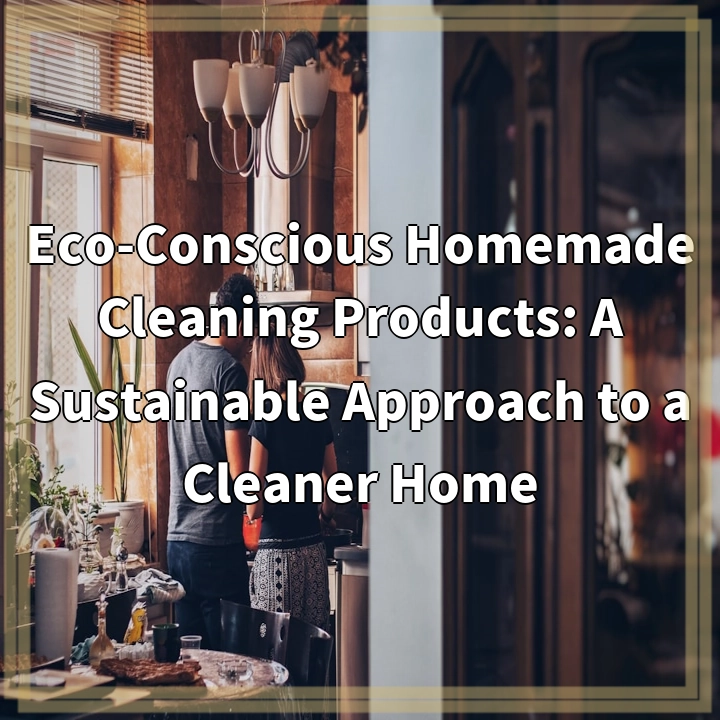
What It Is
Eco-conscious homemade cleaning products are environmentally friendly alternatives to conventional cleaning supplies. These products are typically made from natural ingredients that are safe for both human health and the planet. Common components include vinegar, baking soda, lemon juice, and essential oils, which have been shown to be effective in cleaning and disinfecting various surfaces around the home. By opting for DIY cleaning solutions, consumers can reduce their exposure to harmful chemicals, lower their carbon footprint, and contribute to a healthier ecosystem.
Real-World Problems
Despite the many advantages of eco-conscious homemade cleaning products, several real-world problems persist that can hinder their adoption and effectiveness. One significant issue is the widespread perception that conventional cleaning products are more effective than homemade alternatives. Many consumers remain skeptical about the ability of natural ingredients to tackle tough stains and disinfect surfaces properly, leading to a preference for chemical-laden products.
Accessibility and Knowledge
Another challenge is the accessibility of ingredients and knowledge required to create these cleaning products. While ingredients like vinegar and baking soda are generally inexpensive and easy to find, some individuals may not be aware of the vast array of recipes available or might lack the confidence to experiment with making their own cleaners. This can perpetuate reliance on store-bought options that may not be eco-friendly.
Regulatory and Packaging Issues
Additionally, regulatory frameworks surrounding cleaning products can create barriers for the promotion of homemade solutions. Commercial cleaning products undergo rigorous testing and regulation, whereas homemade alternatives do not have the same level of oversight. This can raise safety concerns, especially for families with pets or small children. Furthermore, the lack of standardized packaging for homemade cleaners can lead to confusion about appropriate labeling and usage, further deterring consumers.
Environmental Impact
Lastly, while DIY cleaning products can lessen environmental harm, the overall impact is still dependent on individual choices. For instance, if consumers resort to purchasing single-use plastic bottles or fail to properly dispose of homemade cleaning product containers, the eco-friendly benefits can be negated. Educating the public about responsible usage and disposal practices is crucial for maximizing the positive environmental impact of eco-conscious homemade cleaning products.

Solutions for Promoting Eco-Conscious Homemade Cleaning Products
To overcome the challenges associated with eco-conscious homemade cleaning products, several solutions can be implemented that encourage their adoption and effective use. These solutions focus on education, accessibility, community engagement, and responsible practices.
Education and Awareness
Increasing education and awareness about the effectiveness of natural cleaning products is crucial. This can be achieved through workshops, online tutorials, and informational blog posts that emphasize the benefits and simplicity of making homemade cleaners. Demonstrating the efficacy of these solutions, perhaps through case studies and testimonials, can help shift consumer perceptions and build trust in DIY cleaning methods.
Ingredient Accessibility
Making ingredients easily accessible is another key solution. Local community centers or stores could host regular DIY cleaning product-making events where attendees can learn recipes and obtain ingredients at low or no cost. By creating opportunities for people to engage with eco-conscious cleaning practices in a hands-on manner, individuals may be more inclined to try these alternatives at home.
Community Support and Resources
Establishing a community support network can also help individuals feel more confident in their choices. Online groups or forums dedicated to eco-conscious living can provide a platform for sharing recipes, tips, and experiences with homemade cleaning products. This communal approach fosters a sense of belonging and encourages individuals to experiment with eco-friendly solutions.
Promoting Safe Practices
Addressing safety concerns regarding homemade cleaners is essential. Providing guidelines for safe storage, usage, and labeling of these products can alleviate fears around their use, especially among families with young children or pets. Clear instructions on how to handle and store homemade cleaners responsibly can further boost consumer confidence.
Sustainable Packaging and Disposal
Finally, promoting sustainable packaging and disposal practices around homemade cleaning products can enhance their environmental benefits. Encouraging consumers to recycle containers or repurpose items for storage can contribute to waste reduction. Additionally, highlighting methods for composting or properly disposing of ineffective cleaning solutions can further support eco-conscious efforts and minimize ecological harm.















